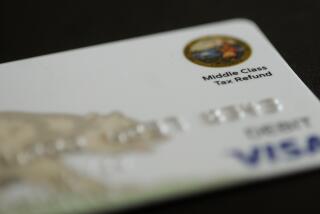A Taxing Problem : Bureaucracy: Dealing with the state Employment Development Department leaves a Venice seafood dealer confused and deeper in debt.
- Share via
Richard Kelly feels as if he’s living in one of those horror movies where the monsters only appear to be dead--and then, uh-oh, they’re ba-a-a-a-ck!
The Venice seafood dealer last year fought and won a battle with the state Employment Development Department over a tax bill from a failed business venture. He believed he owed the state less than $3,000. The agency, because of a clerical error it took months to acknowledge, claimed the bill was nearly $20,000.
Now comes the sequel. This time, the dispute is over whether Kelly defaulted on a payment plan for the tax bill. Kelly claims the state agency mishandled one of his checks and is blaming him for it.
The agency’s mistakes are bad enough, Kelly says, but what he finds more galling is what he describes as its “we’re right, you’re wrong” attitude.
“I don’t think they realize how much damage they do, or care,” he said.
In his original dispute with the agency, the subject of a Times article last year, Employment Development
Department officials refused to review Kelly’s account, despite his protests. Under department policy, officials told him, once a tax assessment has been completed, an account will not be reviewed until the entire balance has been paid. In other words, Kelly would have to pay the more than $19,700 tax bill before the agency would review the case to see if the bill was in error.
In the new disagreement with Kelly, agency officials again refuse to discuss the case with him. Instead, they have simply dipped into his bank account to take nearly $2,000 they say he owes. Kelly says he has bounced some checks as a result, and his new seafood business is imperiled.
Kelly’s underlying problems with the Employment Development Department stemmed from the bankruptcy of a seafood distribution business, Blue Oyster Brokerage, that he started in 1983. After an ownership dispute in 1985, he bought out two partners and tried to run the business alone. Mounting debts forced him to file for Chapter 7 personal bankruptcy in May, 1986.
As part of the bankruptcy settlement, he was assessed $2,873 in taxes by the Employee Development Department. The agency, as part of its task of administering the state’s unemployment insurance program, collects unemployment taxes from employers.
Due to a clerical error, however, the agency did not record Kelly’s bankruptcy settlement and continued to assess unemployment taxes, along with interest and penalties, as if Blue Oyster had continued operating.
By April, 1989, Kelly received a notice that the state had recalculated his taxes, and he now owed $10,500. A month later, he received another notice, this time informing him that his tax bill was in excess of $19,700.
After dozens of phone calls, the agency eventually acknowledged its error and reduced Kelly’s bill to $4,748, which represents the original $2,873 plus interest and penalties. He worked out a payment plan of $200 per month and thought that the matter was resolved.
He was wrong.
Kelly began to make monthly payments on the tax lien in April. In June, short of cash and unable to make his payment, he notified Bret Harlan, a collections official assigned to his account. Harlan told Kelly not to let it happen again, but he made no mention of any action that would be taken against him.
Kelly mailed three subsequent checks covering July, August and September to the department, reducing the balance to $3,253, according to his records.
But the August check went astray. Kelly suspects it was because he paid his Blue Oyster account with a check bearing the name and address of his new business, Softshell Crabs Unlimited.
In any case, the Employment Development Department opened a new account for Softshell Crabs Unlimited and deposited the $200 check. Meanwhile, because the check never made it to the Blue Oyster account, the agency thought he missed his August payment.
When Kelly started receiving mail addressed to a Softshell Crabs Unlimited account, he suspected something was wrong and called the agency’s Sacramento office and spoke with Jerry Sanchez, a collections official.
“He said, ‘Oh, we seem to have made a mistake,’ ” Kelly said. Sanchez told Kelly that he would take the check and put it into the Blue Oyster account.
On Sept. 20, however, Kelly was notified by Security Pacific Bank that the state had cleaned out his checking account, taking nearly $2,000. Kelly called Harlan, the state collections agent, the next day and asked to have the levy released, as it seemed to him to be based on the agency’s error.
According to Kelly, Harlan then told him he would not get his money back because he had missed his June payment, and his record of payments was inconsistent. The account was therefore in default, and the state was exercising its right to levy his bank account for up to the full amount of the tax bill.
But if the levy was based on the missed June payment, Kelly argued, it would have been assessed in June or July, not in September. “As far as I was concerned, it was fishy,” he said.
Officials at the Employment Development Department refuse to comment on Kelly’s case. “We don’t make it a policy to discuss these matters,” said Valerie Reynoso, deputy director of communications. She would only confirm information that is public record, specifically, that the state had filed a tax lien against Kelly for approximately $4,900 in August, 1988. Other than that, “he can basically tell you anything he wants to,” she said.
Meanwhile, Kelly says he is growing impatient, and his seafood business is hanging by a thread. Two soft-shell crab suppliers have cut off his credit because of the bounced checks.
“My business has hit a brick wall here, because they’re my two biggest suppliers,” he said.
And to make a bad situation even worse, he had to move out of his office last week because his building was sold. He now has to come up with first and last month’s rent, along with money for a security deposit, to move into new office space.
The only response Kelly has received from the state agency, besides its refusal to return the levied funds, was that it sent him some forms to renegotiate the payment plan. “This time, they’re doing it in writing,” Kelly said.
If nothing else, Kelly’s dealings with the Employment Development Department have made him a confirmed pessimist.
He learned last week that the agency had no record of his September payment--even though Kelly already has got the canceled check back from the bank.
And he is still receiving mail pertaining to the Softshell Crabs Unlimited account. He is sure it is only a matter of time before the state tries to come after him for unemployment taxes for all his company employees--even though there are none but himself.
More to Read
Inside the business of entertainment
The Wide Shot brings you news, analysis and insights on everything from streaming wars to production — and what it all means for the future.
You may occasionally receive promotional content from the Los Angeles Times.










